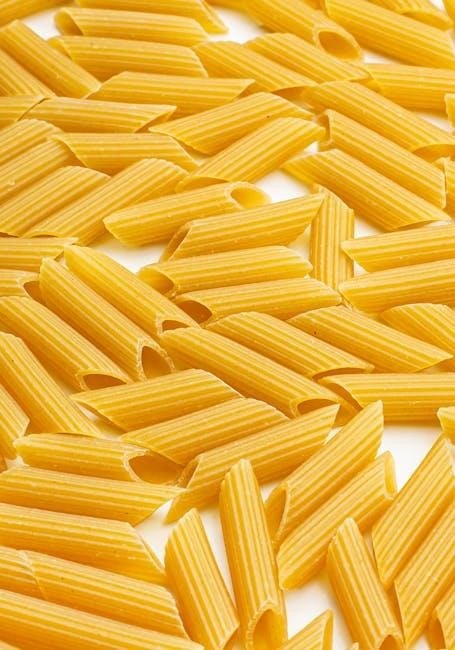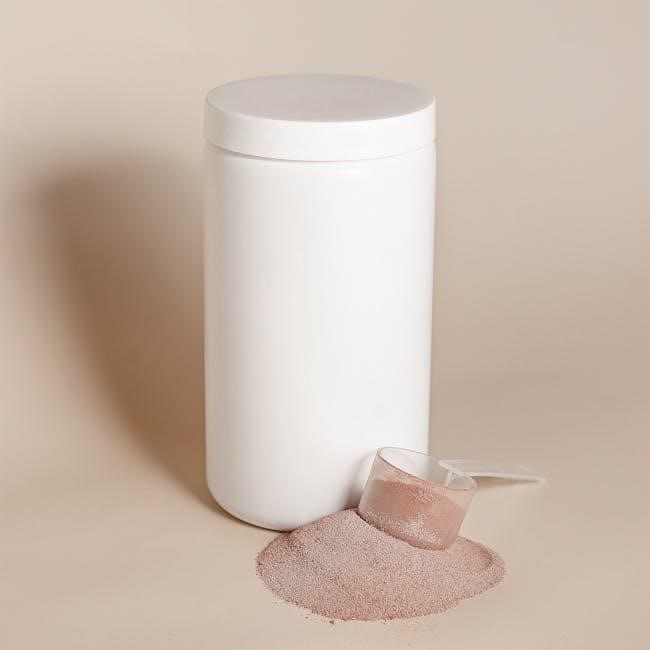A well-structured diet plan is essential for muscle gain, focusing on nutrient-dense foods, proper meal frequency, and caloric intake to support muscle growth and recovery.

Overview of the Diet Plan
A comprehensive diet plan for muscle gain focuses on creating a caloric surplus while ensuring adequate intake of protein, carbohydrates, and healthy fats. It emphasizes nutrient-dense foods, proper hydration, and strategic meal timing to optimize muscle growth and recovery. The plan is tailored to individual needs, considering factors like daily activity levels, weight goals, and dietary preferences. By balancing macronutrients and maintaining consistency, the diet supports lean muscle development without excessive fat gain. Additionally, it incorporates supplements like protein powder and creatine to enhance results. Regular adjustments based on progress ensure the plan remains effective and sustainable over time, helping individuals achieve their muscle-building objectives efficiently.
Importance of Nutrition in Muscle Gain
Nutrition plays a crucial role in muscle gain, as it provides the necessary fuel for workouts and recovery. A diet rich in protein supports muscle repair and growth, while carbohydrates offer energy for training sessions. Healthy fats are essential for hormone production, which aids in muscle development. Proper hydration ensures optimal bodily functions, and balanced nutrient intake prevents deficiencies. Without adequate nutrition, muscle growth is hindered, and recovery is slower, making it harder to achieve desired results. A well-planned diet ensures the body has the resources needed to build and maintain muscle mass effectively, making nutrition a cornerstone of any successful muscle-building regimen.
Setting Realistic Goals for Muscle Gain
Setting realistic goals is vital for a successful muscle gain journey. Aim to add 0.5-1 kg of muscle per month, as rapid gains often result from water retention or fat. Break down long-term objectives into smaller, manageable targets, such as increasing bench press or adding a kilogram of muscle monthly. Track progress through measurements, strength gains, and progress photos to stay motivated. Unrealistic expectations can lead to frustration, so align goals with your lifestyle, genetics, and training experience. A structured plan with achievable milestones ensures steady progress and maintains consistency, which is key for sustainable muscle growth over time.

Understanding Caloric Surplus
A caloric surplus is essential for muscle gain, requiring more calorie intake than expenditure. It fuels muscle growth and recovery, supporting lean tissue development effectively.
What is a Caloric Surplus?
A caloric surplus occurs when you consume more calories than your body burns, creating an energy imbalance. This excess energy is crucial for muscle gain, as it provides the necessary fuel for muscle growth and repair. When you’re in a caloric surplus, your body can allocate additional energy to build and maintain muscle tissue, especially after intense workouts. However, it’s important to balance the surplus to avoid excessive fat gain. The quality of calories matters too, ensuring they come from nutrient-dense sources like protein, carbohydrates, and healthy fats. A well-planned caloric surplus supports muscle hypertrophy and recovery, making it a cornerstone of any effective diet plan for muscle gain.
Calculating Daily Caloric Needs
Calculating daily caloric needs is a critical step in designing a diet plan for muscle gain. It involves determining your total daily energy expenditure (TDEE), which factors in your basal metabolic rate (BMR), physical activity level, and other lifestyle factors. A safe and effective caloric surplus for muscle gain typically ranges from 250 to 500 calories above your maintenance level. Tools like the Harris-Benedict equation or the Mifflin-St Jeor formula can help estimate your BMR, which is then adjusted for activity. For example, someone with a TDEE of 2,500 calories may aim for 2,750 to 3,000 calories daily. Tracking food intake through a diary or app ensures accuracy. Consistency and gradual adjustments based on progress are key to sustaining muscle growth without excessive fat gain.
Maintaining a Caloric Surplus
Maintaining a caloric surplus is essential for muscle gain, as it provides the energy your body needs to build and repair muscle tissue. To sustain this surplus, focus on nutrient-dense foods like lean proteins, complex carbohydrates, and healthy fats. Aim to distribute your calories evenly across 5-6 meals per day to avoid overeating and promote steady energy levels. Avoid consuming excessive empty calories from sugary or processed foods, as they can lead to fat gain without benefiting muscle growth. Instead, prioritize whole foods and track your daily intake to ensure you consistently meet your caloric goals. Adjusting portion sizes and meal frequency can help maintain the surplus without overdoing it, supporting muscle growth while minimizing fat accumulation.

The Role of Protein in Muscle Growth
Protein is essential for muscle repair and growth, providing the amino acids needed to build and strengthen muscle tissue. Adequate intake supports recovery and muscle development.
Importance of Protein for Muscle Repair and Growth
Protein is a cornerstone of muscle growth, as it provides the amino acids necessary for muscle repair and development. During intense workouts, muscle fibers undergo micro-tears, and protein is essential for rebuilding and strengthening these tissues. Adequate protein intake ensures that muscles recover efficiently, promoting growth and increasing overall muscle mass. Without sufficient protein, the body may struggle to repair muscle damage, leading to slower progress and potential muscle loss. The recommended daily intake for those aiming to gain muscle is typically 1.6-2.2 grams of protein per kilogram of body weight. Consuming high-quality protein sources, such as lean meats, fish, eggs, and plant-based alternatives, helps maintain muscle synthesis and supports overall muscle health. Timing protein intake, especially post-workout, can further enhance recovery and growth, making it a critical component of any muscle-building diet plan.
Best Sources of Protein
High-quality protein sources are vital for muscle growth and repair. Lean meats like chicken breast and turkey provide ample protein with minimal fat. Fish, such as salmon, offers additional omega-3 fatty acids for overall health. Eggs are a versatile and complete protein option, while dairy products like milk and Greek yogurt are excellent for their protein content and convenience. For plant-based diets, legumes (beans, lentils), tofu, and tempeh are essential. Nuts and seeds, though calorie-dense, contribute valuable protein. Protein powders, like whey or pea protein, are beneficial for meeting daily protein goals. Incorporating a variety of these sources ensures a broad intake of essential amino acids, crucial for muscle synthesis and recovery, supporting effective muscle gain.
Timing Your Protein Intake
Protein timing plays a significant role in optimizing muscle growth and recovery. Aim to consume protein evenly throughout the day, with a focus on post-workout nutrition. Research suggests that consuming a protein-rich meal or shake within 1-2 hours after exercise can enhance muscle synthesis. Additionally, starting your day with a protein-packed breakfast helps maintain muscle protein synthesis. Including a source of protein before bed, such as cottage cheese or casein, can support overnight recovery. Consistency is key, as spreading protein intake across 3-5 meals promotes a steady supply of amino acids to muscles. Timing strategies should align with individual training schedules and overall caloric goals to maximize muscle gain effectively. Balancing timing with total protein intake ensures optimal results for those focused on building muscle.

Carbohydrates and Fats: Their Roles
Carbohydrates fuel workouts and recovery, while fats support hormone production and overall health, making them both essential for a balanced diet plan focused on muscle gain.
Role of Carbohydrates in Energy Production
Carbohydrates are the primary energy source for intense workouts and muscle activities. They break down into glucose, fueling muscles during exercise and replenishing glycogen stores post-workout. Adequate carb intake ensures sustained energy levels, preventing fatigue and supporting muscle recovery. Complex carbs like whole grains and vegetables provide steady energy release, while simple carbs, such as fruits, offer quick energy boosts. Balancing carb intake with protein and fats optimizes energy production and supports muscle growth. Proper timing of carb consumption, such as pre- and post-workout, enhances performance and recovery. Without sufficient carbohydrates, energy levels may drop, impacting workout intensity and muscle gain progress. Thus, they are a cornerstone in a muscle gain diet plan.
Importance of Fats for Hormone Production
Fats play a crucial role in hormone production, which is vital for muscle growth and overall health. Healthy fats, particularly omega-3 and omega-6 fatty acids, support the synthesis of hormones like testosterone and growth hormone, essential for muscle development. Saturated fats also contribute to hormone balance, aiding in the regulation of anabolic processes. A diet deficient in healthy fats can lead to hormonal imbalances, negatively impacting muscle gain and recovery. Incorporating sources like avocados, nuts, and olive oil ensures adequate fat intake, promoting optimal hormone function. Balancing fats with carbohydrates and proteins is key to maintaining hormonal health and supporting muscle-building goals. Without sufficient fats, hormone production may decline, hindering muscle growth and overall progress in a muscle gain diet plan.
Balancing Carbohydrates and Fats
Balancing carbohydrates and fats is crucial for optimizing energy production and supporting muscle growth. Carbohydrates provide immediate energy for workouts, while fats sustain long-term energy and support hormone production. Aim for a balance where carbohydrates make up 40-50% of your calories, primarily from complex sources like whole grains and vegetables, to maintain workout intensity and recovery. Fats should constitute 25-30% of your intake, focusing on healthy options like avocados, nuts, and olive oil, which promote hormonal balance. Avoid excessive refined carbs and saturated fats to prevent fat gain and health risks. Properly balancing these macronutrients ensures sustained energy, supports muscle function, and maintains overall dietary harmony, which is essential for achieving muscle gain effectively.

Supplements and Hydration
Supplements like protein powder and creatine can enhance muscle growth, while proper hydration supports muscle function and recovery. Both are vital for maximizing training and muscle-building efforts effectively.
Essential Supplements for Muscle Gain

When following a diet plan for muscle gain, certain supplements can enhance your progress. Protein powder is a cornerstone, providing convenient high-quality protein to meet daily requirements. Creatine monohydrate is widely researched and proven to increase strength and endurance during workouts. Branch-Chain Amino Acids (BCAAs) support muscle recovery and reduce soreness. Additionally, mass gainers can help individuals struggling to consume enough calories for a surplus. Multivitamins ensure adequate micronutrient intake, which is crucial for overall health and muscle function. While supplements are beneficial, they should complement, not replace, a balanced diet. Consistency and proper dosing are key to maximizing their effectiveness. Always consult a healthcare professional before adding new supplements to your regimen.
Benefits of Proper Hydration
Proper hydration is vital for muscle growth and overall health. Water transports nutrients and hormones to cells, supporting muscle repair and recovery. Even mild dehydration can reduce exercise performance, leading to fatigue and decreased strength. Staying hydrated ensures optimal bodily functions, including digestion and metabolism, both crucial for muscle gain. Additionally, water helps flush out toxins and waste products, such as lactic acid, which can accumulate during intense workouts. Aim to drink plenty of water throughout the day, especially before, during, and after training sessions. A general guideline is to consume 3-4 liters daily, adjusting for activity levels and climate. Proper hydration not only enhances physical performance but also supports muscle maintenance and growth, making it a cornerstone of any effective diet plan for muscle gain.
Avoiding Over-Supplementation
While supplements can enhance muscle gain, over-supplementation can lead to unnecessary health risks and financial waste. Many individuals overconsume protein powder, creatine, and other supplements, believing more is better. However, excessive intake may cause digestive issues, kidney strain, or imbalances in essential nutrients. It’s crucial to stick to recommended dosages and focus on whole foods as the primary source of nutrition. Supplements should complement, not replace, a balanced diet. Additionally, avoid combining too many products, as this can lead to overloading on certain vitamins or minerals. Always consult a healthcare professional before adding new supplements to your regimen. A disciplined approach ensures safety and maximizes the benefits of your diet plan for muscle gain without compromising overall health.

Meal Planning and Frequency
Effective meal planning and timing are crucial for muscle gain, ensuring consistent nutrient intake and optimizing energy levels throughout the day to support growth and recovery.
Structuring Your Meals
Structuring your meals is vital for consistent nutrient intake and muscle growth. Aim for a balanced diet with protein, carbohydrates, and fats at each meal. Include lean proteins like chicken, fish, or eggs, complex carbs such as whole grains or vegetables, and healthy fats like avocados or nuts. Meal frequency should be spaced evenly throughout the day, ideally 5-6 meals, including pre- and post-workout nutrition. Portion control ensures you maintain a caloric surplus without overeating. Staying hydrated and avoiding processed foods is also key. Consistency in meal structure helps sustain energy levels and supports muscle repair and growth. This approach ensures your body receives the necessary nutrients to build and recover effectively, aligning with your muscle gain goals.
Optimal Meal Frequency
Optimal meal frequency plays a crucial role in muscle gain by ensuring consistent nutrient intake and energy levels. Aim for 5-6 meals per day, including breakfast, pre- and post-workout meals, lunch, dinner, and snacks. This frequency helps maintain a positive nitrogen balance and supports muscle recovery. Space meals evenly, ideally every 2-3 hours, to keep energy levels stable and prevent excessive hunger. Post-workout meals are particularly important for replenishing glycogen stores and promoting muscle repair. Stay hydrated throughout the day, as water is essential for digestion and nutrient absorption. Adjust meal timing based on your schedule and training routine, but consistency is key. Avoid overeating in fewer meals, as this can lead to poor nutrient distribution and reduced muscle-building efficiency. Listening to your body and adjusting meal frequency as needed ensures a personalized approach to muscle gain.
Snacking Strategies
Snacking is a key component of a muscle gain diet, as it helps maintain a positive nitrogen balance and prevents muscle breakdown. Opt for nutrient-dense snacks like nuts, seeds, fruits, and protein-rich options such as Greek yogurt or protein shakes. Aim for 2-3 snacks per day, spaced between meals, to keep energy levels steady. Post-workout snacks are particularly important, combining carbohydrates and protein to replenish glycogen and support recovery. Avoid unhealthy snacks high in sugar or trans fats, as they can hinder progress. Stay hydrated by including water-rich snacks like fruits or vegetables. Snacking strategically ensures consistent nutrient intake without overeating, supporting muscle growth and overall performance. Balance snack portion sizes to avoid excessive calorie consumption while meeting your muscle-building goals.

Tracking Progress and Adjustments
Regularly monitor muscle growth through measurements, progress photos, and strength gains. Adjust your diet and training based on results, ensuring consistency and gradual improvements over time.
Monitoring Muscle Growth
Monitoring muscle growth is crucial to ensure your diet and training are effectively promoting muscle development. Start by tracking your weight, body fat percentage, and measurements weekly. Use progress photos to visually assess changes in muscle mass and definition. Additionally, keep a food diary to ensure you’re meeting your caloric and nutrient goals. Strength gains are another key indicator—note increases in lift weights or reps over time. Regularly assess how your clothes fit and overall physique. For accuracy, measure body fat percentage monthly and track muscle circumference for specific muscle groups. Consistency in tracking helps identify patterns and areas for improvement, allowing adjustments to optimize muscle gain. Aim to monitor progress every 1-2 weeks to stay motivated and informed.
Adjusting Your Diet Plan
Adjusting your diet plan is essential to maintain progress toward muscle gain. Regularly assess your caloric intake and macronutrient balance to ensure they align with your goals. If muscle growth plateaus, consider increasing calories by 5-10% to boost energy availability. Reevaluate protein intake to ensure it meets or exceeds 1.2-2.2g per kg of body weight. Carbohydrate and fat ratios may need tweaking based on energy needs and dietary preferences. Incorporate new foods or meal ideas to keep the diet varied and prevent monotony. Monitor digestion and adjust fiber intake to avoid discomfort. Stay hydrated and consider adding supplements like creatine or BCAAs if beneficial. Adjustments should be data-driven, using progress tracking to guide changes. Fine-tuning your diet ensures sustained muscle growth and keeps your nutrition plan optimized for performance and recovery. Consistency combined with strategic adjustments yields the best results over time.
Consistency in Diet and Training
Consistency is the cornerstone of any successful diet and training program for muscle gain. Sticking to your meal plan and workout routine ensures progressive overload and steady muscle development. Skipping meals or workouts can hinder progress, as muscle growth relies on a sustained caloric surplus and regular stimulation. Aim to maintain a daily routine, including balanced meals and timed nutrient intake, to optimize recovery and growth. Avoid impulsive changes to your diet or training without proper assessment, as this can disrupt your progress. Track your consistency to identify patterns and stay motivated. Over time, consistent effort in both diet and training will yield noticeable results, reinforcing the importance of patience and dedication in achieving muscle gain. Remember, muscle growth is a long-term commitment that requires unwavering consistency.

Common Mistakes to Avoid
Overeating can lead to excess fat gain, while undereating may hinder muscle growth. Neglecting food quality and patience often derails progress in muscle gain diets.
Overeating and Its Consequences
Overeating is a common mistake in muscle gain diets, often leading to excessive fat accumulation rather than lean muscle growth. Consuming more calories than needed, even from healthy sources, can result in weight gain beyond muscle mass. This not only hinders progress but also increases the risk of health issues like insulin resistance and digestive discomfort. Additionally, overeating can make it harder to maintain a consistent diet plan, leading to frustration and discouragement. It’s essential to track caloric intake carefully and balance meals to avoid this pitfall. Focus on nutrient-dense foods rather than excessive portions to support muscle growth without unnecessary fat gain.
Under-Eating and Its Impact
Under-eating is a significant mistake that can hinder muscle gain by depriving the body of essential nutrients and calories needed for growth and recovery. When caloric intake is too low, the body may begin to break down muscle tissue for energy, counteracting muscle-building efforts. Additionally, under-eating can lead to fatigue, weakness, and poor workout performance, making it difficult to train effectively. Severe caloric deficits can also slow down metabolism and reduce hormone production, further impacting muscle growth. It’s crucial to ensure adequate nutrition while avoiding excessive restrictions. A balanced diet that meets daily caloric and nutritional needs is vital for sustainable muscle gain and overall health.
Importance of Food Quality
Food quality plays a critical role in muscle gain, as nutrient-dense foods provide the necessary building blocks for muscle growth and recovery. Prioritizing whole, unprocessed foods like lean meats, fish, eggs, whole grains, fruits, and vegetables ensures adequate intake of essential vitamins, minerals, and antioxidants. Processed foods, while convenient, often lack these nutrients and can hinder progress. Poor food quality can lead to inflammation, digestive issues, and suboptimal nutrient absorption, all of which negatively impact muscle growth. Conversely, high-quality foods promote better recovery, muscle function, and overall health. Balancing nutrient-dense meals with occasional treats is key to maintaining a sustainable and effective diet plan for muscle gain.